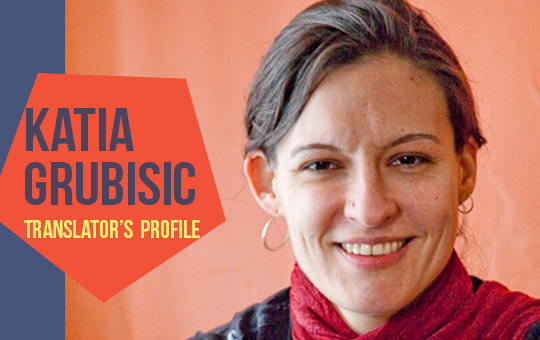In this email interview conducted by Editor-in-Chief Lee Yew Leong, award-winning poet and translator Katia Grubisic took time out of her busy schedule to discuss the state of Canadian literature (in English and in French) as well as the challenges she faced translating David Clerson’s lyrical novel, Brothers (recently featured in our Translation Tuesday showcase at The Guardian), including “the ‘bitch’ problem.”
Lee Yew Leong (LYL): David Clerson’s haunting novel Brothers, in your outstanding translation, would not be out of place in the fiction section of our Winter 2017 edition, not only because of the seaward-facing figures connecting many of the pieces but also because of the strong animal motifs. Among the other elements that make up this story’s poetic permutation: brothers and fathers, dreams, the very act of story-telling. As the translator—and therefore arguably the closest reader of the novel—what do you think David Clerson is trying to say with Brothers, and how do you think these elements come together to fit the overall arc?
Katia Grubisic (KG): Thank you for your kind words.
Yes, the novel’s sea-journey theme, the search for the father, the pretty far-out cynanthropy, the origin story, the twin motif—it almost feels mythological, and David’s baroque style in this book lends it a kind of timeless timbre.
As the translator, I may, in fact, be the worst placed to comment on what it’s about, second perhaps only to the author himself! What drew me to the narrative was first the landscape, the way the sea and the briny hills become almost their own character, anchoring and tormenting the brothers (who try to escape their identity as determined by the place they’re from), and drawing them to their inevitable return. Brothers explores how who we are and who we become is shaped by those who make us, including in this case, literally the knife-wielding though well-intentioned mother, who wants to give her firstborn son a companion as a buffer against the cruel world. The brothers are shaped also by their absent “dog of a father,” or rather—and this is telling—by the often conflicting stories told about him. Yet they push at these familial forces, the draw of the origin story, and the magic and tragedy as they try on and define new selves, and their own universe, has such compelling pathos. You don’t want to be them, but you can’t look away.
LYL: The novel at once reminds me of The Return, a film by Andrey Zvyagintsev about two brothers waiting for their father’s return, and Yann Martel’s Life of Pi, which not only involves an odyssey on a boat, but also similarly injects a magical realism into the story-telling. What other literary ‘predecessors’ might I, as a non-Canadian, have missed?
KG: I don’t know that Brothers’ ancestry is nationally bound. When I first read the book, it reminded me of Agota Kristof’s Le Grand cahier—the brothers, the old mother, the violence. Pas du tout, David told me; in an interview, he said he had been reading a lot of Cormac McCarthy at the time! He wrote it too at the height of the Printemps érable student and popular uprising in 2012, which subtly tinged the narrative. Though I agree that both The Return and Life of Pi could be seen as kin, in terms of devices and preoccupations.
The wonderful thing about fiction is that it can belong to whichever reader happens to crack the spine. The region David evokes spoke to me so vividly of the Baie des Chaleurs shores in eastern Quebec and northern New Brunswick, but when I asked him about it, he conceded that many had pegged his setting as the Gaspésie region, but spoke instead of the imprint left by work he had read in his youth, including Golding and Stevenson, and even of a dream he once had, in which he saw himself fishing a dead dog out of a lagoon.
READ MORE…



